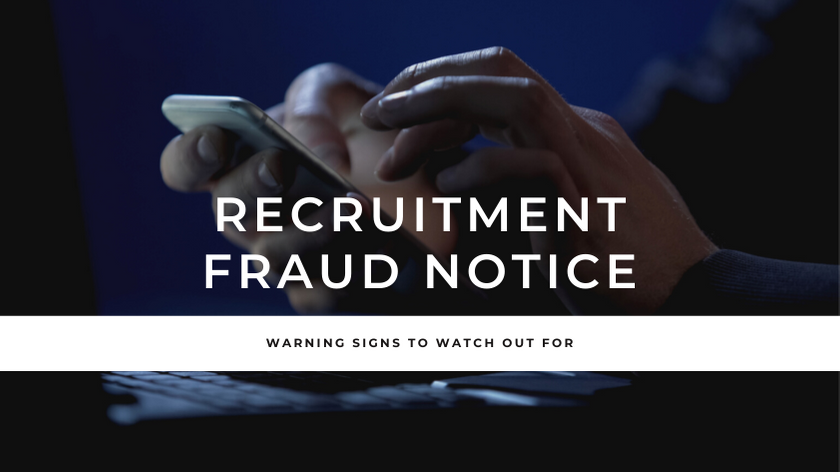
Recruitment Fraud Notice: Warning Signs to Watch Out For
Are your candidates getting bombarded with job offers out of the blue?
Perhaps you’ve even received them and wondered what was happening. Here’s some advice on how to recognize them and what to do when it happens.
Recruitment fraud cases are on the rise, a type of scam that targets job seekers with fake employment opportunities made up by fraudsters. Scammers list non-existent jobs, hoping to get money from unsuspecting people. Threat actors also use recruitment fraud and fake headhunting to steal personal data they can use in identity theft.
The Bulk of Recruitment Fraud Incidents Happen Online.
Scammers post fake jobs on legit job boards or send fake recruitment emails and text messages (SMS). Criminals also create fake websites, usually copying a real site and changing a letter or two in the URL to fool visitors. Scammers reinforce the facade with fake social media accounts and plagiarized posts on LinkedIn.
The cherry on top is unsolicited emails with lofty claims of being from a well-known organization. It’s easy to locate an employee’s name and use the organization’s logo to project legitimacy. It seems that these criminals have all their bases covered to pull-off recruitment fraud.
Education is the Best Defense Against Fraud.
Employers follow a set of universal rules during the recruitment process. If you need more information on how a company’s recruitment operation works, you can always contact them or visit their website.
Here are a few you should know about:
- For the most part, employers or legitimate recruitment agencies will always use their domain and email address. If you see company.com (domain) and [email protected] (email), it’s most likely legit. Scammers often use free email services like YahooMail, Gmail, or Hotmail and free site hosting services. You’ll likely see something like company/freewebservices.com and john@company/freewebservices.com. So, if you get an email, verify the source first.
- Real companies will never ask for your personal information through email or any other means. They only ask for your details once you get the job and sign the contract. If you get an email from someone that does, it could be a phishing attempt that aims to steal your data for identity theft. Protect yourself by using an identity theft monitoring tool that will alert you if your credentials were compromised.
- Legitimate companies won’t send out job offers without a formal interview first. If you know that you didn’t apply for a position in a company, but get a job offer out of the blue, contact the company’s recruitment office to clarify. Real companies also always call using the company landline. They won’t send a text or call using a mobile phone.
- Real companies will never ask for money or compensation from job candidates. If someone asks payment for taxes, background checks, travel expenses, accommodation, or any fees, you can bet that person is a scammer.
Warning Signs of Recruitment Fraud.
- The message is not addressed to you personally.
- They ask you to send money to pay for fees, travel, training, or credit checks.
- The message doesn’t list the company’s street address, only a PO box. or email address.
- They request that you share financial information to set up a company account for direct deposits of your salary.
- The sender uses a free email address (Yahoo, Gmail, etc.).
- You receive unsolicited email or text for job offers you never applied for.
- The job details are vague, and the sender doesn’t specify any skills, previous experience, and other qualifications.
- The compensation package is too good to be true.
- The sender is asking for personal details like your DOB, Social Security number, or banking details.
- The message has a lot of spelling mistakes and grammatical errors.
- They require you to set up a Hotmail account because the recruitment officer will contact you via Skype.
- Your computer’s antivirus system flags the email as malicious or detects malware in the attachments.
- You are sent links to fake websites so the scammers can record any information you enter.
What to Do When You Encounter Recruitment Fraud.
Call your local authorities if you receive a suspicious email about a job. Contact your bank immediately if you gave the criminals your banking details. You can also send notifications to email providers that the email account is fraudulent and request that they close it:
- Gmail: [email protected]
- Hotmail: [email protected]
- Yahoo: [email protected]
Do your homework on companies through research and due diligence best practices. Find out everything you can about them to ensure that you’re dealing with a real organization.
Authors
Daniel William
Daniel William is a Cyber Security Expert. His great passion is to maintain the safety of the organization’s online systems and networks. He knows that both individuals and businesses face the constant challenge of cyber threats. Identifying and preventing these attacks is a priority for Daniel. You can reach Daniel on Linkedin
Recruit Smarter
Weekly news and industry insights delivered straight to your inbox.




